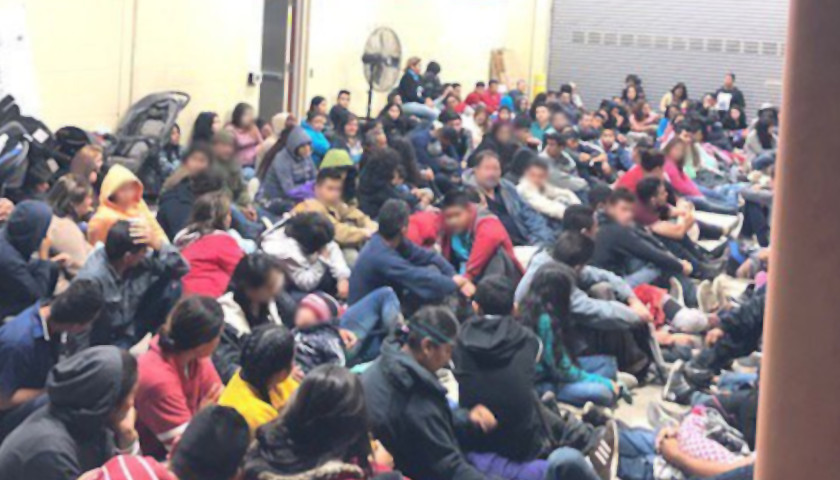by Kevin Daley
The Supreme Court allowed the Trump administration Wednesday to enforce new immigration rules that would deny asylum to migrants who did not seek protected status in a country they passed through on their way to the southern border.
Justices Ruth Bader Ginsburg and Sonia Sotomayor dissented from Wednesday’s decision.
 The Border Patrol has intercepted approximately 350,000 asylum seekers from the northern triangle countries of El Salvador, Guatemala and Honduras in 2019. The new rule would require migrants to seek asylum in Mexico or some other country through which they pass before seeking protected status in the U.S.
The Border Patrol has intercepted approximately 350,000 asylum seekers from the northern triangle countries of El Salvador, Guatemala and Honduras in 2019. The new rule would require migrants to seek asylum in Mexico or some other country through which they pass before seeking protected status in the U.S.
The rule includes exceptions for victims of human trafficking or migrants who were denied asylum in another country.
A coalition of migrant and civil rights groups challenged the new rules in federal court. U.S. District Judge Jon Tigar entered an injunction forbidding the government from enforcing the rules across the country in July. The American Civil Liberties Union (ACLU) represents the plaintiffs.
The 9th U.S. Circuit Court of Appeals narrowed Tigar’s injunction, saying it could take effect within the 9th Circuit’s jurisdiction, but not beyond it. That meant the third-country transit bar could be applied to migrants intercepted in New Mexico or Texas, but not Arizona and California. The 9th Circuit also said Tigar could reimpose a nationwide injunction if he made additional factual findings supporting such a move. Tigar did so and restored a nationwide injunction against the contested rule Monday.
The ACLU styled Trump’s rules an “asylum ban” before the Supreme Court. The organization said it violates two federal laws: the Immigration and Nationality Act (INA) and the Administrative Procedure Act (APA).
The INA establishes a general rule that all-comers may apply for asylum, the ACLU argued. Though there are narrow circumstances in which asylum can be denied based on the availability of a third-party alternative, the ACLU believes those conditions are not met here. The plaintiffs also say the new rules should have been subject to a public notice and comment period.
The ACLU connected the current dispute to the administration’s earlier attempts to change asylum rules. In effect, that proposal would have refused asylum to migrants who enter the country illegally. The administration asked the Supreme Court to let those rules take effect, but the justices refused on a 5-4 vote in December 2018.
“Like the first ban, this second ban would upend a forty-year unbroken status quo established when Congress first enacted the asylum laws in 1980,” the ACLU told the justices in court papers. “But this second ban is far more extreme than the first. The first one at least allowed individuals who presented themselves at a port of entry to apply for asylum. The current ban would eliminate virtually all asylum at the southern border, even at ports of entry, for everyone except Mexicans.”
“The Court should not permit such a tectonic change to U.S. asylum law,” it added.
The government countered that the INA grants the administration broad discretion in determining when to grant asylum. Current conditions necessitate the third-country transit bar, it says. Citing the “unprecedented surge” of migration at the southern border, the government believes its new rules will help distinguish serious applicants from frivolous claims and alleviate mounting pressure on an overburdened system.
Elsewhere in its filing, the government said it was exercising a foreign policy exception to notice and comment requirements. The new asylum bar is part of broader negotiations with Mexico, Guatemala, Honduras and El Salvador over the migration crisis, government lawyers said.
“The injunction prohibits the executive branch from implementing an interim final rule adopted to address an ongoing crisis at the southern border, with significant implications for ongoing diplomatic negotiations and foreign relations,” Solicitor General Noel Francisco told the justices in court papers.
The case is No. 19A230 Barr v. East Bay Sanctuary Covenant.
– – –
Kevin Daley is a reporter for the Daily Caller News Foundation.




